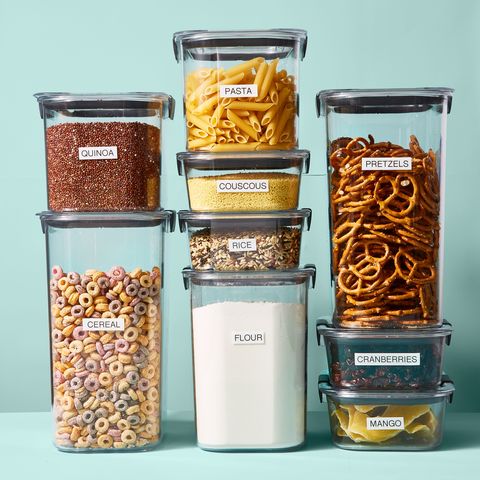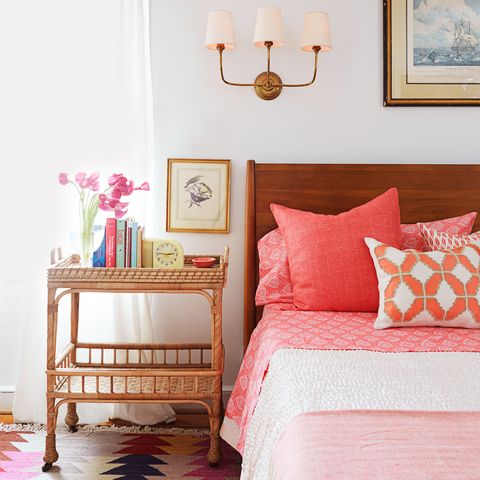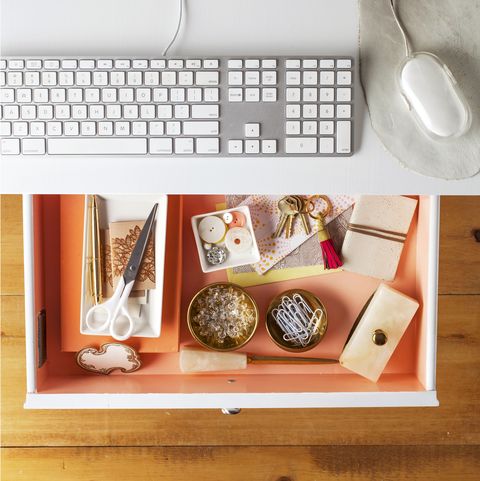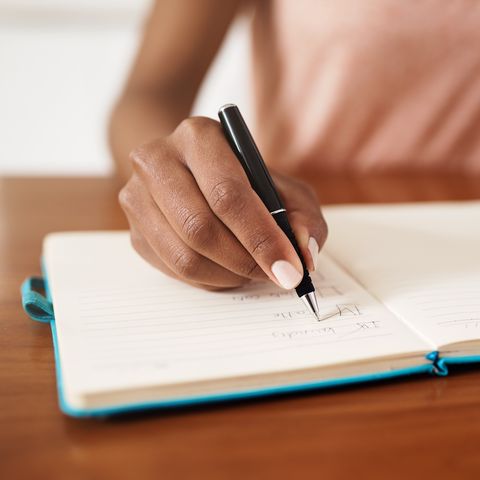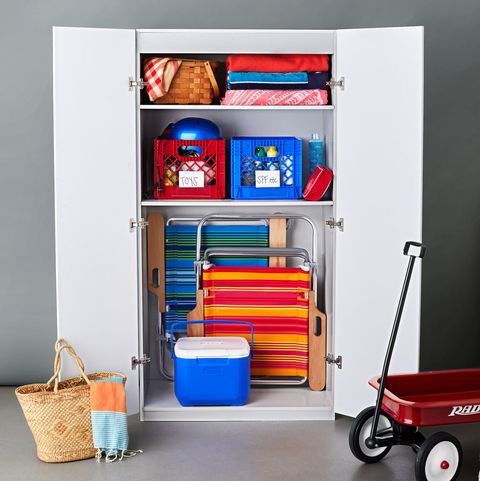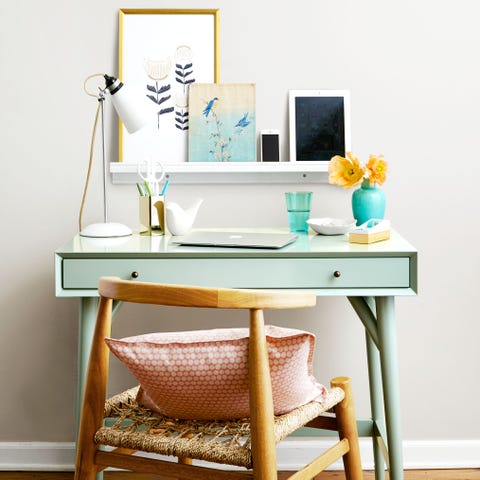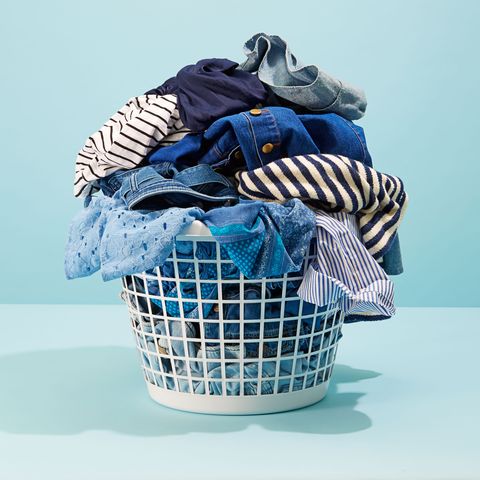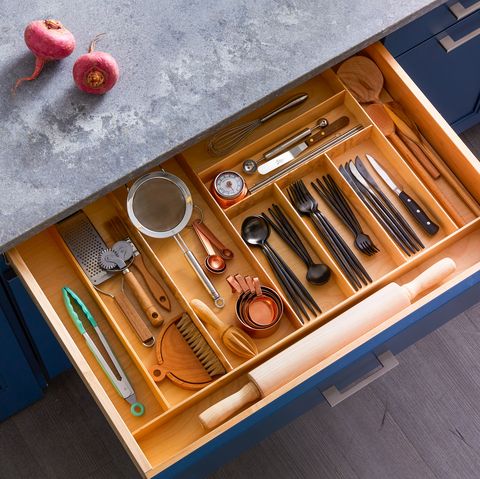
[ad_1]
If you consider yourself a messy person, you may be wondering: What exactly is the point of being organized? Well, consider this: When you gain more control over your stuff, you can shift your mindset from reactive (where is that school slip?!) to one that’s proactive. “Organization gives you your time back,” says Lisa Woodruff, CEO and founder of Organize 365. And more time equals less stress. “We surveyed 1,500 men and women in the U.S. on the state of housework in America. Eighty-six percent believe organizing is a learnable skill. And when we asked ‘how do you feel when you’re organized?’ most women said they feel relieved,” she says.
But where do you even begin? Here, experts share how self-reflection, changes in perspective and, yes, organizational strategies can help you become a more organized person at home and in life.
This content is imported from {embed-name}. You may be able to find the same content in another format, or you may be able to find more information, at their web site.
1. Know Your “Organization Style”
Beautiful rows of clear canisters in your pantry holding all of your dried goods and snacks sure look amazing — but some organization methods are not for everyone. “Organization is not one-size-fits-all. People try to copy the things they see in media, but if it doesn’t work for you, you’re wasting money and time struggling to set up that system,” says Cassandra Aarssen, host of Hot Mess House on HGTV. (She’s a former self-confessed slob, FYI.) The goal is to follow a type of organization style that is suited to your personality — “so that you can set up a system the way that your brain naturally organizes, so you’re not wasting time or money,” she says. (Cheers to letting go of the type of organizer you wish you were!)
First, start with this question, says Aarssen: Are you a visual or a hidden organizer? If visual, you prefer to see your belongings and gravitate toward open shelves, clear bins and hooks to hang your stuff. On the other hand, “hidden” organizers do better putting everything away in drawers or on hangers in a closet. Also consider if you tend to do better with more detailed (ahem, perfectionist) or simple systems. Cater to your organizational habits and you’ll work with — not against — yourself.
2. Start With Your Bedroom
It’s the first place you see when you open your eyes and the last thing you see when they close at bedtime. “Your bedroom should be a place of calm and order so you can start and end the day on a good note,” says Aarssen.
When looking to organize your bedroom space, the first step is to declutter, she says. But that doesn’t mean removing everything from your closet and making “keep,” “toss” and “donate” piles — and then being faced with the task of putting everything away again. Leave everything where it’s at. Instead, you’re on a mission to hunt for the items that can go and then removing them, therefore clearing out clutter and space. Of course, you’ll inevitably come across those things that you think you should hold on to just in case you have an occasion to wear/use them again. So ask yourself: “If I didn’t own it, would I buy it again?” “If the answer is ‘no,’ it has to go,” says Aarssen. This method can be repeated with any room in your home, such as the pantry, garage or basement.
3. Get It Out of Your Head
Clutter isn’t just what we can see. “Often, it’s clutter that we think is holding us back. But it’s the mental load that we’re carrying,” says Woodruff. She’s referring to how we struggle to remember what we need to do each day, week and month. So, when you need to remember something, write it on a notepad or jot it down in the Notes function in your phone. Need to remember to change the furnace filter? Write it down. Need to order more fish oil for your dog? Write it down. Need to make an appointment with your PCP for your annual? You got it, write it down. Every week (Woodruff recommends Sunday), go through your list — “this keeps all of your priorities in your home life top of mind”— and determine what you’ll tackle in the week ahead. This system takes about six weeks to set in and for you to finally feel as if you’re in control, but you should find that you have more mental clarity and that your weeks flow better, she says.
4. Make “Homes” for Your Stuff
You know the drill: You come home and throw your keys and cellphone on the counter. Sometimes, though, you throw them on the couch in the living room. And occasionally it’s in the mudroom. One time, it was the refrigerator. (What?) Aarssen recommends creating “homes” for your stuff for where you naturally put it down. For example, if you’re tossing things on your dresser when you get home, you’ll want to purchase a “catch-all” tray. Not only does it look neater, but you’ll save time when you don’t have to run around your house looking for the things you need to get out the door.
5. Shorten Your To-Do List
Woodruff writes her next day’s to-do list the night before on an index card. (It’s the size of her phone, so she can carry the two together and easily reference her calendar when needed.) But, there’s an art to deciding what goes on the list: “My to-do list isn’t a wish list. It should all be done at the end of the day,” she says. That means don’t overextend yourself or aim to do more than you possibly can. Most people can do three to five things a day, she says, but for some people even three will be stretching it. “Your job in life is not to be so productive so that you can tackle longer and longer to-do lists. Your job is to do a couple key things each day and then live your life,” she says.
6. Try the 5-Minute Tidy Up
One of the best habits you can start is to set a timer for five minutes (go ahead: ask Alexa) to tidy up every day, says Aarssen. Put clothes in your hamper, hang up that wayward shirt sitting on your bed, put that glass on the coffee table into the dishwasher. “Cleaning daily is the secret to long-term success,” she says. Eventually, tidying up as you go will become a natural habit, leading to a more clutter-free life.
7. Follow Your Energy
Planning to spend the weekend cleaning out your garage is a fast way to tank your motivation and lead to procrastination. Woodruff recommends choosing a project that has a defined start and stop. For example, clean out that shelving unit in the garage. (Or just one shelf, for that matter.) And, you get to choose whatever task you feel like. If the garage is too big of a monster to tackle but going upstairs to clean out your sock drawer sounds more palatable and doable, then follow that energy, complete that task and move on with your day.
8. Add Purpose to Your Space
During the pandemic, homes turned into places to live, work and school. And if you started WFH, you may have found yourself working all over your home. (Sometimes at the kitchen table. Often sitting on your bed. Occasionally in the bathroom when the house gets too noisy.) But it’s also important for your belongings to have a set place because you can then make these areas purposeful.
So, name that corner of your living room your home office — and then outfit it accordingly. Get a small desk for the space, have a charging cord always plugged in, buy a bin for papers. “The mental mindset shift allows you to make the space function more efficiently and naturally store things better,” says Woodruff.
9. Have Your Non-Negotiables
Count doing the dishes and laundry as the two tasks that should appear on your everyday list of non-negotiables. “They get out of control really quickly, so it’s important to include both in your daily routine,” says Aarssen. Waiting too long to do the dishes leads to dried-on food that’s ultimately more difficult and time-consuming to clean, she says. Laundry also piles up, whether that’s dirty or clean clothes waiting to be folded. “While one load of laundry takes five minutes to fold, a week’s worth of laundry takes one hour,” says Aarssen. Aim to do one load a day if you have a large family — and set an alarm as a reminder. Yes, you may ignore it sometimes, but the auditory signal will prompt you to do it more often.
10. Set Up Your Kitchen for Practicality
Don’t underestimate the impact of an organization system that’s intuitive. And one of the best places to put this into practice is in your kitchen. Intuitive means that you know where to put things without thinking and can do so in a speedy flash — cutting down on the time it takes to put things away, too. For instance, says Aarssen, dishes should be stored above your dishwasher, so that they can be put away efficiently. “If it’s easy to do, you’re more likely to do it,” she says.
This content is created and maintained by a third party, and imported onto this page to help users provide their email addresses. You may be able to find more information about this and similar content at piano.io
[ad_2]
Source link

